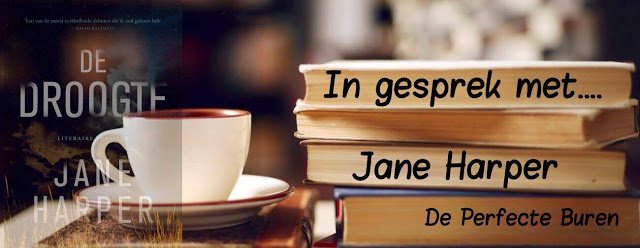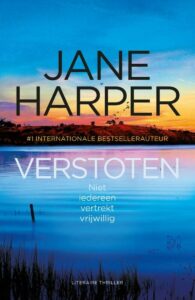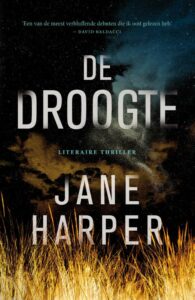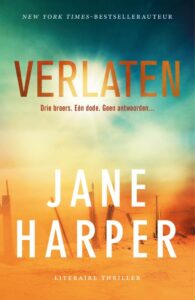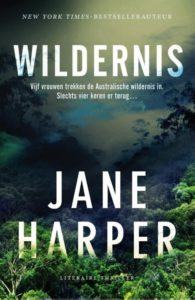Dankzij A.W. Bruna Uitgevers hadden wij een erg leuk en exclusief interview met niemand minder dan JANE HARPER, auteur van ‘De droogte’ en ons ‘Boek van de maand’ maart.
Ben jij ook zo benieuwd of Aaron Falk terugkomt in een tweede boek of wat Jane haar reactie was toen ze hoorde dat de filmrechten verkocht waren van ‘De droogte’? Je leest het allemaal in het interview hieronder.
1. Could you tell us something about the writing process from your book please? Did it take you long to write?
I’ve always been a big reader and hoped to write a novel one day. I didn’t know where to start when I applied for the Curtis Brown Creative 12-week online novel writing course in late 2014. As part of the application process I submitted a synopsis and 3000-word extract. I came up with an idea for a murder-mystery set in regional Australia, and that idea eventually became ‘The Dry’.
The course started in October 2014, and I completed a first draft during the 12 weeks. I continued working on various drafts and entered the manuscript in the Victorian Premier’s Literary Award in May 2015. I was lucky enough to win the prize, which was amazing and generated a lot of interest from agents and publishers. I gained agent representation through Curtis Brown Australia and continued revising the manuscript before selling the novel first in Australia and then in more than 20 territories around the world.
2. Where did your inspiration come from to write this book? Was it something you read somewhere or is it something you experienced yourself? Do you know a similar village like Kiewarra? Did you find the inspiration for the story from your own experience?
The fictional town of Kiewarra features heavily in the novel, and is a drought-stricken community in regional Victoria, Australia, five hours from Melbourne. The town itself is a mix of many rural communities I visited while working as a journalist in Australia and the UK. Covering news stories in rural areas gave me a sense of what it is like for people who are reliant on things they cannot control, such as the land and the weather. I was also interested in those communities where people have known each other, for better or worse, for most of their lives.
I think a lot of the themes explored in a small-town setting are actually very universal. A sense of community, neighbours having to work together in the face of local challenges, and the suggestion that the person next door knows more about you and your past than you may like – these are all things that people in very different communities can relate to.
3. The film rights have been sold to Pacific Standard. Who would you like to see as leading actor in this film?
I don’t really have any specific actor in mind! I would hope any film would keep the very Australian characters and setting, but I think there are a lot of actors who would fit the role so I would be interested to see who was put forward. I think it would have to be someone with a little bit of mystery about them, but also someone the audience could relate to.
4. What was your first reaction when you found out the film rights were sold?
Having the interest from Pacific Standard was fantastic and something I had never even considered might happen! I was completely surprised when I found out they were interested, I hadn’t even known they had read the manuscript so it came out of the blue! It was an amazing thing to happen. It gave the novel such a boost before publication and really helped spread word of mouth interest. A lot of things have to come together for a film to be made, but I would love to see it on the screen.
5. ‘The dry’ has been published in the Netherlands / Belgium and we’ve read it and it has great reviews. The Dry has been sold to more than 20 foreign language territories. How do you feel about that?
I’m absolutely thrilled that the novel has been sold in so many territories. It is such an Australian book that I didn’t know if it was something that readers overseas would relate to. But I’m really pleased that publishers and readers in so many territories have enjoyed it.
6. Are you under pressure for writing the next one now ‘The dry’ is such a great success?
It is a very different experience writing the second novel. When I wrote ‘The Dry’, there was no expectation or pressure around it, whereas this time I have publishing contracts and readers asking when it will be out. But writing novels is what I always wanted to do so I’m very lucky to have the opportunity to write more books. I think the only thing I can do is write the best book that I can and hope that readers who enjoyed ‘The Dry’ also enjoy the new one.
7. Will there be a series around Aaron Falk?
Aaron Falk is returning in the second book, which will be published in Australia in late 2017 and in the UK and US in early 2018. It is set in a different location from ‘The Dry’, but once again is based in an isolated part of regional Australia. Falk faces another mystery with a few twists and turns along the way.
8. And how did this character come to life?
Aaron Falk left his home town of Kiewarra under a cloud as a teenager and built a new life for himself in Melbourne as an officer with the Federal Police. He is a financial investigator who is reluctant to return to the drought-stricken farming community and even more reluctant to stay for any length of time. I wanted his character to be very much at odds with the people he left behind in the town – he is fairly quiet and cerebral and is a fish out of water on his return. The fact that he is such an outsider allows him to be the readers’ eyes and ears and it is through him they experience the shock at just how far this community has fallen.
9. Do you have a writing schedule you stick to or not?
When I’m working on a novel, I try to write every day as I think it develops good habits to have that routine. I prefer to start work as early in the day as possible, but I had a baby in September 2016 so I have to fit in time where I can. Rather than focusing on a word count, I try to write a chapter or a complete scene every time I sit down. I find that helps push the story forward and also makes me think carefully about why that scene is in the book and what needs to happen. I also avoid rewriting until I have a complete first draft on paper. I just try to get to the end as quickly as I can. If I think of something I need to add in earlier, I make a note to come back to it on the second draft. I found that stops me from constantly rewriting and fiddling with the start and never actually reaching the end!
10. Did you ever experience a drought like in your book – and the consequences of it?
Fortunately I never have experienced drought conditions like the ones in ‘The Dry’, but plenty of people in Australia have. Many farmers have gone through incredibly difficult times and drought is an ongoing problem in this country. I did a lot of reading around the topic and I also drew heavily on my experiences as a journalist and listening to people facing various challenges in small communities. I found that whatever challenges a community is facing, the reactions around their fears and hopes for the future are often surprisingly similar.
Thank you very much for this interview, much appreciated!!!
Kind regards
Nancy
Perfecte Buren
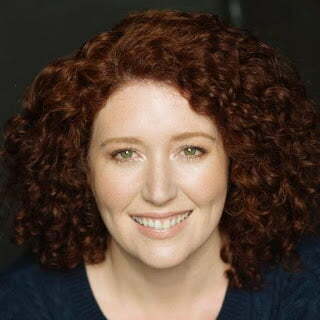
Eerder verschenen op Perfecte Buren.
